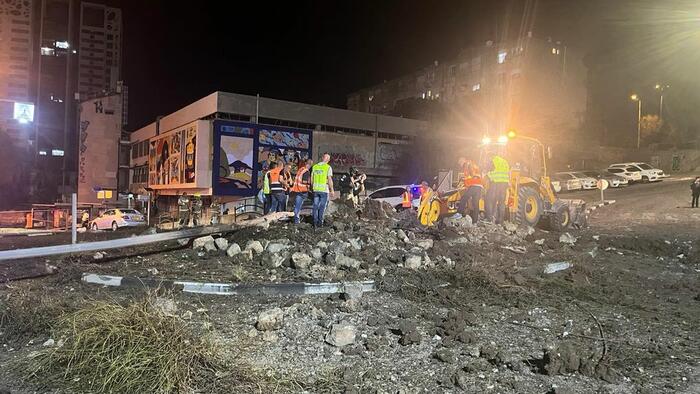In recent developments, the northern Israeli port city of Haifa has come under intense and unprecedented missile bombardments from Hezbollah for the second consecutive day. In a matter of hours, the city endured multiple waves of rocket attacks, with over 100 missiles launched within a half-day period, including a striking last barrage of 20 rockets alone. The Israel Defense Forces (IDF) have reported that, while many of these rockets were intercepted, there were confirmed impacts that caused significant damage to several homes and left a 70-year-old woman injured from shrapnel. This alarming escalation in attacks signifies the most extensive assault Haifa has faced since the outbreak of hostilities between the Lebanese militant group Hezbollah and Israel.
These recent barrages began with an initial launch of 85 missiles, followed by subsequent attacks that targeted various parts of Haifa, including residential areas, infrastructure, and a restaurant. Reports from regional media highlight how the city’s breathtaking Haifa Bay became a focal point for the latest violence, which the IDF has confirmed is the largest scale of missile strikes Haifa has witnessed thus far. Particularly concerning is the residential impact; a building in the Haifa Bay region was reported to have been struck, further endangering civilians in the area. The continuing intensity of these attacks illustrates both the deteriorating security situation and a significant shift in the operational capacity of Hezbollah to engage directly with Israeli territory.
In response to the surge in attacks, the IDF has taken strategic measures, including deploying air force drone strikes against Hezbollah rocket launchers believed to be responsible for the missile launches targeting Haifa. The ongoing conflict in the region has also extended into southern Lebanon, which remains an active battlefield, compounded by frequent airstrikes striking Beirut. The Israeli government has recognized the escalated threat, leading to heightened military operations and increased vigilance across northern Israel, with air defenses actively engaged in protection of civilian areas.
Hezbollah, the militant group behind these recent aggressions, has publicly justified its actions by claiming support for the Palestinian cause in Gaza, positioning the attacks as a form of defense for Lebanese sovereignty as well. This rhetoric underscores Hezbollah’s longstanding political narrative of resisting Israeli actions and aligning itself with broader regional Islamic movements. The group’s deputy leader even hinted at a potential willingness to negotiate with Israel, although this comes amid violent confrontations. Israel, standing firmly against any notion of compromise amidst the current tension, has declared its intention to sustain military operations in Lebanon for the foreseeable future.
Amid these exchanges, Defense Minister Yoav Gallant provided an update on significant offensive actions taken by Israel in recent weeks, specifically mentioning the elimination of Hashem Safieddine, who was rumored to be the potential successor to the slain Secretary-General Hassan Nasrallah. Gallant expressed confidence that the loss of key leadership within Hezbollah would present major challenges for the organization. He argued that with both Nasrallah and possibly his successor removed, Hezbollah lacks a coherent leadership structure to direct its operations, which could lead to increased instability within the group itself.
The larger implications of these hostilities are vast, as Gallant noted that these developments are being observed throughout the Middle East, particularly in Iran, which has heavily backed Hezbollah. He proclaimed that the conflict damaging Hezbollah’s capabilities could signify a major strategic loss for Iran’s influence in the region. As tensions rise, the focus on immediate military outcomes and long-term geopolitical ramifications continues, with a cautious eye on whether Hezbollah’s openness to negotiations will manifest despite the ongoing violence and Israel’s assertive military posture in Lebanon. The future remains uncertain, as both sides gear up for possible extended engagements or shifts towards dialogues amidst regained stability.

